Taipei, Taiwan – China’s ruling party has concluded the Third Plenum of its 20th Central Committee with a communique that has left many China watchers disappointed. The 5,000-word document, issued on Thursday, has been described as vague and cliché, lacking specific measures to address China’s economic difficulties.
Shi He-ling, an associate professor of economics at Monash Business School at Monash University in Caulfield, Australia, expressed his disappointment with the communiqué, stating that its writers seemed to lack any real thought or direction.
The communiqué, which touted the Chinese Communist Party’s achievements in “comprehensively deepening reforms,” emphasized the importance of “Chinese-style modernization” in building a strong and rejuvenated nation. However, Shi pointed out that while Chinese President Xi Jinping has set out a new vision for this modernization, the communiqué fails to provide any measurable definitions.
“It reads more like a philosophical article, full of clichés,” Shi told VOA.
In addition to highlighting the importance of “socialist market mechanisms” and “new quality productivity,” the communiqué also stressed the significance of national security as a foundation for the steady and long-term development of Chinese-style modernization. It also emphasized the modernization of national defense and the armed forces, with “party leadership” being the “fundamental guarantee” for promoting this policy.
Yeh Yao-yuan, chairman of the Department of Political Science at the University of St. Thomas in Houston, Texas, stated that under the framework of “Xi Thoughts,” it is difficult for the economic exposition of this communiqué to be new. He further added that even though the “socialist market economic system” is repeatedly touted, it will not be enough to reverse China’s economic decline. Yeh believes that Xi’s economic reform is essentially “changing things back to their old ways.”
This includes forcing the private sector to retreat in order to help the state advance and tightening controls over foreign capital, which will have a negative impact on the market economy.
Ming Chu-cheng, professor emeritus of political science at National Taiwan University in Taipei, shared a similar assessment at a seminar in Taiwan on Thursday. He stated that while Xi may be promoting the market economy, his actions suggest otherwise. “The people retreat and the country advances” is completely opposite to what he claims, Ming said. He also expressed little hope for the Third Plenum, stating that even if economic restrictions are relaxed, the same problems will resurface in the future due to politics choking the economy.
The communiqué received over 100 million views on Weibo and quickly made it to the hot search list after its release. However, there was hardly any substantive discussion among Chinese netizens in the comment sections. Most simply reposted and recited parts of the communiqué to express their concerns.
The personnel changes made at the plenum also garnered attention, as the CCP officially approved the removal of its former foreign minister, Qin Gang, from its Central Committee. Qin, who has not been seen in public since last summer, is no longer a member of the Communist Party leadership. He was dismissed as foreign minister in July last year and removed from the post of state councilor three months later.
The party’s published decision referred to Qin as “comrade,” and his resignation from the top body was accepted. However, no further details were provided, and the reasons behind Qin’s disappearance remain unclear. There have been allegations of him being investigated for having an extramarital affair, leaking secrets, and endangering national security.
The plenum also confirmed the expulsion of former Defense Minister Li Shangfu, as well as Li Yuchao and Sun Jinming of the People’s Liberation Army’s Rocket Force from the Central Committee.
Many online comments focused on Qin being referred to as “comrade” in the party’s decision, while others saw his removal as a “soft landing.” However, after the discussion on Qin’s removal gained traction, the Weibo accounts of various media outlets seemed to have been alerted, and comments were concealed.
Chong Ja Ian, an associate professor of political science at the National University of Singapore, stated that Beijing dislikes Chinese people arguing online about the CCP’s high-level personnel changes. This is because such discussions may call into question the party’s decisions and judgment, especially as Qin was previously Xi’s close confidant and the foreign minister.
“What happened to Qin has not been made public


